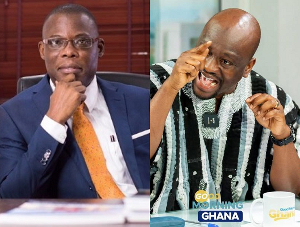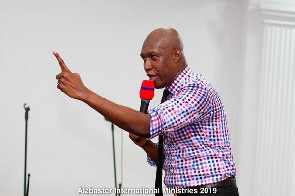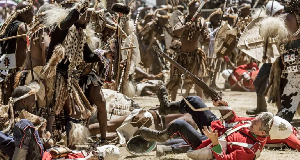Re: Dennis Brutus (1924-2009): Africa's Most Refined Poet - A Tribute*
*OR, A POPULAR TRIBUTE TO DENIS BRUTUS!* To Comrade Dennis Vincent Brutus, 1924-2009, A tribute!
By Nana Akyea Mensah, The Odikro.
A Rejoinder to: "Dennis Brutus (1924-2009): Africa's Most Refined Poet - A Tribute", Feature Article of Wednesday, 30 December 2009 Columnist: Okoampa-Ahoofe, Kwame
"'In the wake of his passing on Dec. 27 at the gloriously mature age of 85, Prof. Olu Oguibe, interim director of the African-American Studies Institute at the University of Connecticut, was quoted to be rather mischievously claiming that “[Dennis] Brutus was arguably Africa’s greatest and most influential modern poet after Leopold Senghor (1906-2001) and Christopher Okigbo” (1932-1967). For my part, and I make bold to assert without fear of contradiction that, indeed, “Dennis Brutus was a poet of unbested refinement and the most delicate of esthetic sensibilities among Africa’s major poets of the twentieth century.”'
- Kwame Okoampa-Ahoofe, Jr.
This is not the first time we see Okoampa turning his attention to South Africa. As usual, the attention has a hidden agenda. I wish Okoampa will have the balls to challenge me on this assertion so I would have the time and the opportunity to fully deal with him on this issue. For now, suffice it to say that Okoampa's principal objective in writing this tribute, is more to be seen by what he chooses to emphasise in this man's life. For Okoampa, it must be the poetry! This is clearly an attempt to castrate the enormous significance of Dennis Brutus life and his political struggles and to reduce him into a sterile and remote poet only to be missed by "renowned sonneteers" and "comrade of the tie-die-sporting order"! This is not going to happen. Denis Brutus was truly a man of the people and people from all walks of life miss his departure. One does not need to be a poet to celebrate him and emulate his exemplary and extra-ordinary life!
I find the opening of the tribute by Okaompa with an academic quarrel with Prof. Olu Oguibe, interim director of the African-American Studies Institute at the University of Connecticut, completely distasteful. The real 'mischief' here is in the attempt to remove the highly inflammable political stuff he was made of, and its positive influence of example it is wont to stimulate, should the people know about it! Okoampa has no right to do this to this extra-ordinarily great person. I am certain Comrade Dennis Brutus would like to be remembered more for the things that were very close to his heart and which consumed his soul as he shares those experiences in his poetry. In Dennis Brutus, his poetry has its own authentic quality, but the call is beyond that. He wants to wake you up from your political slumber, look around you with your eyes wide open, and become an active participant of history and not a passive spectator or victim. And whilst you are at it, he will never fail to remind you of the urgency of the need to bring down the corporate-dominated and essentially socially-excluding world of the Neo-liberals, who continue to build a new-world order which is not different from business as usual, aimed primarily to ensure that the rich-get-richer-and-the-poor-get-poorer ideology of the dominant ruling classes of the world prevail!
'I know his good friend and prolific novelist,' Okoampa writes, 'as well as “comrade of the tie-die-sporting order” Prof. Ngugi wa Thiong’O, of Kenya, is not having an easy time with the passing of Prof. Dennis Brutus.' What about Chinua Achebe and Wole Soyinka? Denis Brutus helped organize major African writers organizations with his colleagues Wole Soyinka and Chinua Achebe! What about the millions of the people of world with whom he shared his last thoughts and hope for humanity during the recent COP 15, the UN Climate Chance Summit in Copenhagen, December 7-18, 2009? The real tribute to Comrade Dennis Brutus is that this man's passing on does not lead to and eclipse of revolutionary genius and social and climate justice advocacy. The call must focus on not leaving a void! The life we are celebrating today is a life worthy of presenting to our own sons and people we love, even though it was also a tough and difficult life. Misfortunes never waited on virtues, so the saying goes, nor is success the constant guest of virtue. This man's life was primarily driven by a zeal for change that he very adroitly advocated. He was a constant friend of the poor and the marginalised of this world. It just happens that in Dennis Brutus a very vital link between the black and white community opposed to Apartheid was opened.
Having been rejected by the system as a non-white because of his mixed blood he became one of the most celebrated fighters against the apartheid regime. It is not just enough to mention this in general terms without explaining the depths and obstacles he encountered and the triumph of his superior organisational skills as a campaigner. He was instrumental in achieving the apartheid regime's expulsion from the 1968 Mexican Olympics and then in 1970 from the Olympic movement. For those unfamiliar with the way vested interests were keen on the participation of South Africa in the 1970 Olympics, that was at the time people like Dick Chenney were publicly, in the US Senate, stating that Nelson Mandela was a terrorist who deserved to be in prison! That was around the same time that here at home the Busia government would begin a policy of "Dialogue" with Apartheid South Africa! The whole world almost seemed in support of the system and it showed no signs of collapsing. Denis Brutus led and won the boycott Apartheid South Africa from the World Olympic movement!
This was the culmination of a hard and bitter struggle he embarked upon as a young man in his twenties. This wa the time when he helped to create the South African Sports Association, which was formed in protest against the apartheid in sports. As Amy Good man puts it:
"Oddly, for this elfin poet and intellectual, it was rugby that early on nagged him about the racial injustice of his homeland. Brutus recalled being sarcastically referred to by a white man as a “future Springbok.”
"The Springboks were the national rugby team, and Brutus knew that nonwhites could never be on the team. “It stuck with me, until years later, when I began to challenge the whole barrier—questioning why blacks can’t be on the team.” This issue is depicted in Clint Eastwood’s new feature film, “Invictus.” President Mandela, played by Morgan Freeman, embraces the Springboks during the 1995 World Cup, admitting that until then blacks always knew whom to root for: any team playing against the Springboks."
"In the late 1950s," Amy Goodman writes in another article, The Poetic Justice of Dennis Brutus, "Brutus was penning a sports column under the pseudonym “A. de Bruin”—meaning “A brown” in Afrikaans. Brutus wrote, “The column ... was ostensibly about sports results, but also about the politics of race and sports.” He was banned, an apartheid practice that imposed restrictions on movement, meeting, publishing and more." He is to agitate up to the world scale until apartheid South Africa was banished from the Olympic Games!
In 1963, whilst on bail he attempted to flee South Africa. Even under custody he was shot and almost got killed as he was trying to escape police custody in the middle of Johannesburg. His remarkable story recounts of a seriously wounded Denis Brutus denied of medical attention because the ambulances available at the police station were for whites only. He had to go through a long wait for an ambulance but was designated for blacks!
Patrick Bond recalls:
"While recovering, he was held in the Johannesburg Fort Prison cell which more than a half-century earlier housed Mahatma Gandhi. Brutus was transferred to Robben Island where he was jailed in the cell next to Nelson Mandela, and in 1964-65 wrote the collections Sirens Knuckles Boots and Letters to Martha, two of the richest poetic expressions of political incarceration."
The Associated Press reported yesterday:
"He received numerous honorary prizes, including a lifetime achievement award from South Africa's Department of Arts and Culture. But in 2007 he rejected induction into the South Africa Sports Hall of Fame, stating, "It is incompatible to have those who championed racist sport alongside its genuine victims. It's time - indeed long past time - for sports truth, apologies and reconciliation."
It is true that you cannot the poet out of him, but as Amy Goodman puts it, "Brutus’ weapons were his words: soaring, searing, poetic. He was banned, he was censored, he was shot. But this poet’s commitment and activism, his advocacy on behalf of the poor, never flagged. Brutus died in his sleep early on Dec. 26 in Cape Town, at the age of 85, but he lived with his eyes wide open. His life encapsulated the 20th century, and even up until his final days, he inspired, guided and rallied people toward the fight for justice in the 21st century."
Even as refugee fighting against efforts by the Reagan administration to deny him continued status as a political refugee and deport him, his effectiveness as an organizer and mover and shaker never diminished. 'After the fall of apartheid and ascension to power of the African National Congress,' Amy Goodman writes, 'Brutus remained true to his calling. He told me, “As water is privatized, as electricity is privatized, as people are evicted even from their shacks because they can’t afford to pay the rent of the shacks, the situation becomes worse. ... The South African government, under the ANC ... has chosen to adopt a corporate solution.”
He went on: “We come out of apartheid into global apartheid. We’re in a world now where, in fact, wealth is concentrated in the hands of a few; the mass of the people are still poor ... a society which is geared to protect the rich and the corporations and actually is hammering the poor, increasing their burden, this is the reverse of what we thought was going to happen under the ANC government.”
You may want to celebrate Denis Brutus as a poet more than anything else burt for some of us, much as his poetry was a "nonpariel" Dennis Brutus would be remembered not only for his contributions that brought down the apartheid system but also as a campaigner for global justice, whose familiar face was everywhere there are mass mobilizations against the World Trade Organization, the World Bank and the International Monetary Fund, G8, and the New Partnership for Africa’s Development.
Amy Goodman writes.
"Even in his last days, Brutus was fully engaged, advocating social protest against those responsible for climate change, and promoting reparations to black South Africans from corporations that benefited from apartheid. He was a leading plaintiff in the Alien Tort Claims Act case against major firms that is now making progress in the US court system."
"...—and, most recently, although not present, giving inspiration to the protesters at the U.N. climate summit in Copenhagen. He said, on his 85th birthday, days before the climate talks were to commence: “We are in serious difficulty all over the planet. We are going to say to the world: There’s too much of profit, too much of greed, too much of suffering by the poor. ... The people of the planet must be in action.”
"The memory of Dennis Brutus will remain everywhere there is struggle against injustice. Uniquely courageous, consistent and principled, Brutus bridged the global and local, politics and culture, class and race, the old and the young, the red and green. He was an emblem of solidarity with all those peoples oppressed and environments wrecked by the power of capital and state elites – hence some in the African National Congress government labeled him ‘ultraleft’. But given his role as a world-class poet, Brutus showed that social justice advocates can have both bread and roses."
Dennis Brutus was a man who called spade a spade, irrespective of the person:
AMY GOODMAN: You have seen the latest news of President Mandela coming to the United States, the former president of South Africa. He met with President Bush. Your thoughts on this? I know there was some concern among activist groups to give President Bush that kind of seal of approval.
DENNIS BRUTUS: Well, there’s a very striking difference between the Mandela who was quite blunt in his criticism, not only of the US entry into Iraq, but also the election itself; so, we had some very frank speaking at that time. And surprisingly, now we find Mandela visiting with President Bush and saying, “Oh, well, friends have this way of criticizing each other.” So, in a sense, he’s climbing down from his previous criticism, and I suppose the explanation is that when he came to the United States, it was mainly in order to raise funds for one of the Mandela foundations. So, it seems to me, being very polite, I would say excessively polite. And indeed, for people who knew him as someone who spoke out bluntly, this is not only a surprise, it’s also a disappointment. We think he should have maintained his position."
At the ripe age of 80 Amy Good man of Democracy Now! interviewed him:
"AMY GOODMAN: As you look back over your eighty years, your own personal, as well as the state of the world, and you look ahead, do you feel like society, civilization, is advancing?
DENNIS BRUTUS: Advancing, I’m not sure. But I have a sense of gathering energy and a kind of will for change, almost as if people are saying, “This is intolerable. We’ve allowed it to go on for too long.” When I’m in Porto Alegre at the World Social Forum or I’m in Lusaka at the African Social Forum or meeting in Mpumalanga and Soweto, the ghettos of South Africa, such an impatience, particularly among young people, that the world must change. There really ought to be a more—greater emphasis on humane values. This nonsense about hanging around in the shopping malls, you know, and competing for Nike or whatever, this is nonsense. We have to get over it. Humanity is about more than material things. And we really must shake off this kind of almost mystification, the way we’ve been—we’ve been caught up in a set of lies and deceptions, and we must try and recover our own humanity. So I’m very hopeful."
The old man was a fighter to the very last breadth. On his 85th birthday a few weeks ago, which coincided with the UN Climate Summit, Conference of Parties COP15, in Copenhagen:
AMY GOODMAN: I wanted to go, actually, to a clip, on his eighty-fifth birthday. It was just a few weeks ago. This is a clip of Dennis Brutus calling for the Seattle-ing of Copenhagen, because climate debt is not on the agenda. He was talking about the climate summit and the protests that he expected. This was just before the Copenhagen climate summit.
DENNIS BRUTUS: From now on, this is going to be part of our challenge, our part of the challenge to the greedy corporate powers that don’t care what happens to the planet. So we expect them to pay attention. We hope that we, ourselves, will pay attention. And then, most difficult of all, we are going to have to join that struggle. There’s not enough time. We are in serious difficulty all over the planet. We are going to say to the world: there’s too much of profit, too much of greed, too much of suffering by the poor. It must have to stop. The planet must be in action. The people of the planet must be in action."
This tribute would not be complete if I do not share with you the anger and pain that this old man has carried to his grave, and the real massage he is giving every serious citizen of our planet:
AMY GOODMAN: A poem from Leafdrift, could you share with us?
DENNIS BRUTUS: Right, I think it would be appropriate to read a poem which is actually about our current protest. You may know, and I think you covered it on Democracy Now!, when we were marching against Kofi Annan and Colin Powell and the World Summit on Sustainable Development, people were marching from the ghettos, from the townships, to this expensive suburb called Santon, where you had this enormous expense, you know, lavish expenditure and talk about making the world a better place, when in fact the world was becoming a worse place. So, we have a poem about it, and I’m going to read that, which is just about the march.
When we marched, Slithered Through slimy mud past riot-shielded cops in Alexander (This is the ghetto.) While children peered wild-eyed from dark windows, For some of us these were re-runs of earlier apartheid-burdened days. But, then, it was defiant resolution that drove our hearts and braced our feet. Now, sadness at betrayal sat sadly on our hearts. Our shouted slogans hung heavy over us in grimy air. We winced at familiar oft-repeated lies Oft-repeated lies.
AMY GOODMAN: Dennis Brutus, reading from his latest collection of poetry called Leafdrift. Why Leafdrift?
I have below, highlights of an interview with Denis Brutus on Democracy Now! with Amy Goodman, who also speaks with his close friend and colleague, Patrick Bond, director of the Center for Civil Society at the University of KwaZulu-Natal in South Africa
December 28, 2009
Happy New Year, Africa and the brave new world! There is victory for the people!!!
-- Nana Akyea Mensah, The Odikro. Facebook: http://www.facebook.com/people/Nana-Akyea-Mensah Blog: http://nanaakyeamensah.blogspot.com/ Twitter: http://twitter.com/TheOdikro
Opinions of Friday, 1 January 2010
Columnist: Mensah, Nana Akyea














